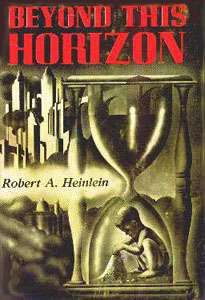Beyond This Horizon
Beyond This Horizon is a science fiction novel by American writer Robert A. Heinlein. It was originally published as a two-part serial in Astounding Science Fiction (April, May 1942, under the pseudonym Anson MacDonald) and then as a single volume by Fantasy Press in 1948. It was awarded a Retro-Hugo award for best novel in 2018.[1]
 First single volume edition – 1948 | |
| Author | Robert A. Heinlein |
|---|---|
| Country | United States |
| Language | English |
| Genre | Science fiction |
| Publisher | Astounding Science Fiction (orig. serial) & Fantasy Press (single book) |
Publication date | 1942 (orig. serial) & 1948 (single book) |
| Media type | Print (Hardcover & Paperback) |
Overview
The novel depicts a world where genetic selection for increased health, longevity, and intelligence has become so widespread that the unmodified 'control naturals' are a carefully managed and protected minority. Dueling and the carrying of arms are socially accepted ways of maintaining civility in public; a man can wear distinctive clothing to show his unwillingness to duel, but this results in an inferior social status. The world has become an economic utopia; the "economic dividend" is so high that work has become optional. The chief economic problem is in fact using up the economic surplus: many high-quality goods actually cost less than those of lower quality. Many people use lower-quality goods as status symbols. The government invests heavily in scientific research, but this has the side effect of further increasing productivity a decade or more later, so long-term projects with no expected economic return are favored above anything but medical research, on the theory that longer lifespans will consume more surplus.
The story's protagonist, Hamilton Felix (surname first), is the archetypal übermensch. Felix is the penultimate step in a "star line" designed to breed for the highest-quality human characteristics. However, he lacks eidetic memory, which disqualifies him for what many consider to be humanity's most important occupation: that of an "encyclopedic synthesist", one who analyzes the sum total of human knowledge for untapped potential. As such, he finds his life—and the society he lives in—to be enjoyable but meaningless. However, when one of these synthesists seeks him out, inquiring when he plans to continue his line, he finds himself drawn into an adventure which not only gives him purpose but convinces him that his society is worth saving after all.
Major themes in the novel are reincarnation, the immortality of the soul, and telepathy. Hamilton Felix is the product of generations of genetic engineering. He is almost but not quite the perfect human. In the second half of the book his genetically engineered son is born. The son is the climax of generations of genetic engineering and selective breeding, and is a genetically perfect human. As the son grows he begins to develop almost superhuman mental abilities and a surprising telepathic ability. As the novel draws to a close, it becomes apparent that the son senses that Hamiton Felix's second child, a daughter, is the reincarnation of a wise elderly government official who foresaw her own death and arranged to die shortly before Felix's daughter was born. This official understood that the soul is reincarnated, and in preparation for her own death and reincarnation she was instrumental in the genetic engineering of the son and daughter.
Reception
Anthony Boucher and J. Francis McComas characterized Beyond This Horizon as among "the finest science fiction novels of the modern crop."[2] P. Schuyler Miller reviewed the novel favorably, saying "in true Heinlein manner the basic theme of the book smashes the screen of action only in the closing pages."[3]
In popular culture
In the Japanese visual novel Eden*, the term 'Felix' is used in the setting to refer to genetically engineered humans with abilities similar to those described in the book, and the connection to Heinlein's work is referred to in dialogue.

See also
- For Us, The Living: A Comedy of Customs
References
- "1943 Retro-Hugo Awards". World Science Fiction Society. Retrieved 2018-04-02.
- "Recommended Reading", F&SF, October 1951, p. 60
- "Book Reviews", Astounding, February 1949, p. 146
External links
- Beyond This Horizon title listing at the Internet Speculative Fiction Database
- Beyond This Horizon at Open Library